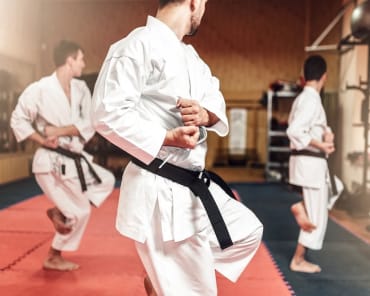As parents we strive to be motivational, but we don’t want to be pushy. There is a fine line between the two, and it is important not to cross that line. We never want to cause our child discomfort to the point that they want to quit something that they love. So how can we as parents be supportive in our child’s journey, without hindering their love for the arts? Take a look at our tips below for some guidance!
- Take an Interest: Ask your child about their classes afterwards. Ask them what they learned, what was fun, if there were any highlights, etc. Don’t ask a question that they can answer with a simple one word, ask them something that will get them talking and engaging with the class after hours! If you are able to, try watching some of the classes in the parent waiting room. This way, after class you can tell you child that they looked great during partner work, or you noticed how they have really been improving one kick that they had been working on. Let them know that you notice their hard work and you can see their improvements in real time!
- Initiate Practice Time: If your child struggles with finding time to practice at home try to make practice more engaging. See if they want to show you something they learned in class, or see if they want to teach you something. Teaching can be a fun way to learn from a different perspective. If your child is one that likes media you can offer to film them on your phone camera and play it back so that they can see what they look like while they practice and use this to pinpoint where they need to focus their practices. You know your child best, nothing is perfect for everyone so utilize your child’s interests to create a fun at-home practice experience.
- Table Talk: Use the dinner table as a space that you can ask your child about the values that they spoke about in class. Are they currently doing a unit on respect, determination, trustworthiness? Bring up keywords like these that are important to the martial arts value and moral system. If your child has siblings you can ask them how their brother or sister can utilizing determination in their own studies and extracurriculars. Show your child how these values have a place not only on the mat, but everywhere else in their lives.
- Commitment: Kids are curious by nature, which makes it sometimes difficult for them to stick with one thing. It is important for kids to have the opportunity to try new activities so that they can find the ones that they love most, but it is also important to instill the value of commitment. If you child reaches a point in their martial arts journey where they want to miss a class, or even quit all together, this is a great time for a conversation about why. Use this time to share with them the value of commitment. Do they want to skip a class because they don’t enjoy the sport as much as something else they are persueing? Or does it have to do with something else that can be remedied?
- Don’t Compare: If your child discusses their efforts in comparison to other students in their classes be sure to stress the fact that everyone learns at different speeds and comparing isn’t a positive method of growth. Insist upon positivity and guide your child away from negativity surrounding their art. Frustrations and disappointments may occur, this is normal, but talk to your child about the root of their frustration and then calmly help them to create a positive resolution to their feelings.
- You’re Not Alone: Finally, don’t forget that you're not alone! As a parent it can feel daunting when you have never delved into the martial arts world before, but thankfully you have the other parents at the school to look to for advice! Speak with the parents of the other black belt students, speak with the parents of your child’s classmates and set up playdates for outside of class so that your child and other children in the class can get together. Take advantage of the ample support system within the school!
Don’t forget that all children are unique, what works for one child may not work for another. Use these tip as a guideline while knowing what your child does and doesn’t respond well to. Find a balance between being supportive and not being too overbearing and you and your child can grow together through their martial arts journey!





